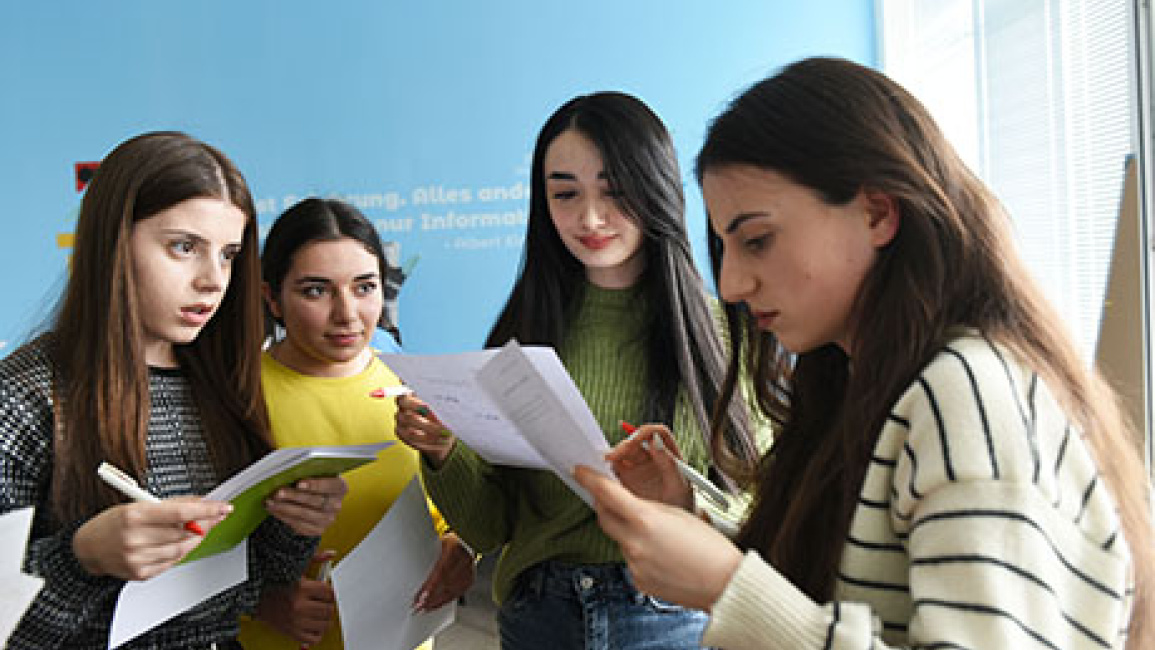- Main
- Node
- YSU STUDENTS ACQUIRE NEW SKILLS FOR TEACHING GERMAN. THE UNIVERSITY VALUES NON-FORMAL EDUCATION
November 29, 2022 | 16:00
Education
Science
YSU STUDENTS ACQUIRE NEW SKILLS FOR TEACHING GERMAN. THE UNIVERSITY VALUES NON-FORMAL EDUCATION
YSU Faculty of European Languages and Communication launched the program implemented jointly with the Tbilisi "Goethe" Institute, the participating students of which, while developing their linguistic knowledge of German, will have the opportunity to be acquainted with modern language teaching methods.

Iris Sonnenberg, an expert in German language teaching at the Goethe Institute of Yerevan, emphasizing the cooperation with the Yerevan State University, noted that this would provide a new opportunity to increase interest in the German language, as well as contribute to the development of the language. In her speech, I. Sonnenberg expressed hope that similar programs will be continuous.

In the conversation with us, Gayane Savoyan, head of the Department of German Philology of the Faculty of European Languages and Communication of YSU, spoke about the work done by the department in the development of German as a foreign language. Speaking of various collaborations, G. Savoyan stated that they are aimed at expanding students' knowledge of the language, as well as making them aware of the continuous development of the language. In this context, she emphasized the program organized in the framework of cooperation with the "Goethe" Institute.

"It is interesting to see how a student in a non-professional field will master teaching methods. It is one thing when you learn a language and become a language specialist, and it is another thing how you will acquire a skill in that language that is common to different professions. It is true that the program will be held in German, but it also provides general knowledge that everyone needs," said the head of the German Philology Department.
Continuing G. Savoyan's speech, Mary Navasardyan, lecturer of YSU European Languages and Communication Faculty, trainer of "Goethe" Institute, also touched on the importance of imparting new methods of teaching German to students, noting that it is important in both countries of the region.

The Goethe Institute trainer pointed out several programs, such as Erasmus+, which provide opportunities for retraining abroad in modern teaching methods. According to Navasardyan, the "Goethe" Institute implements this practice here as well.
"It is important that the program will provide not only pedagogical, but also various other skills, which students will become the most sought-after specialists if they have them," assured M. Navasardyan.

Speaking about the new teaching methods, Mary Navasardyan noted that they are different in each field, in the work done on the texts, in getting to know the audience, in terms of presenting the information more attractively, etc. M. Navasardyan added that different types of teachers would be addressed within the framework of the program. According to her, this is an integral part of informal education.
It should be noted that 30 students applied to participate in the program, and about 20 applicants with the highest level of German language skills were selected.

It is noteworthy that the participating students will receive certificates at the end of the program. The project will create new foundations for the formation and development of cooperation with the "Goethe" Institute.

